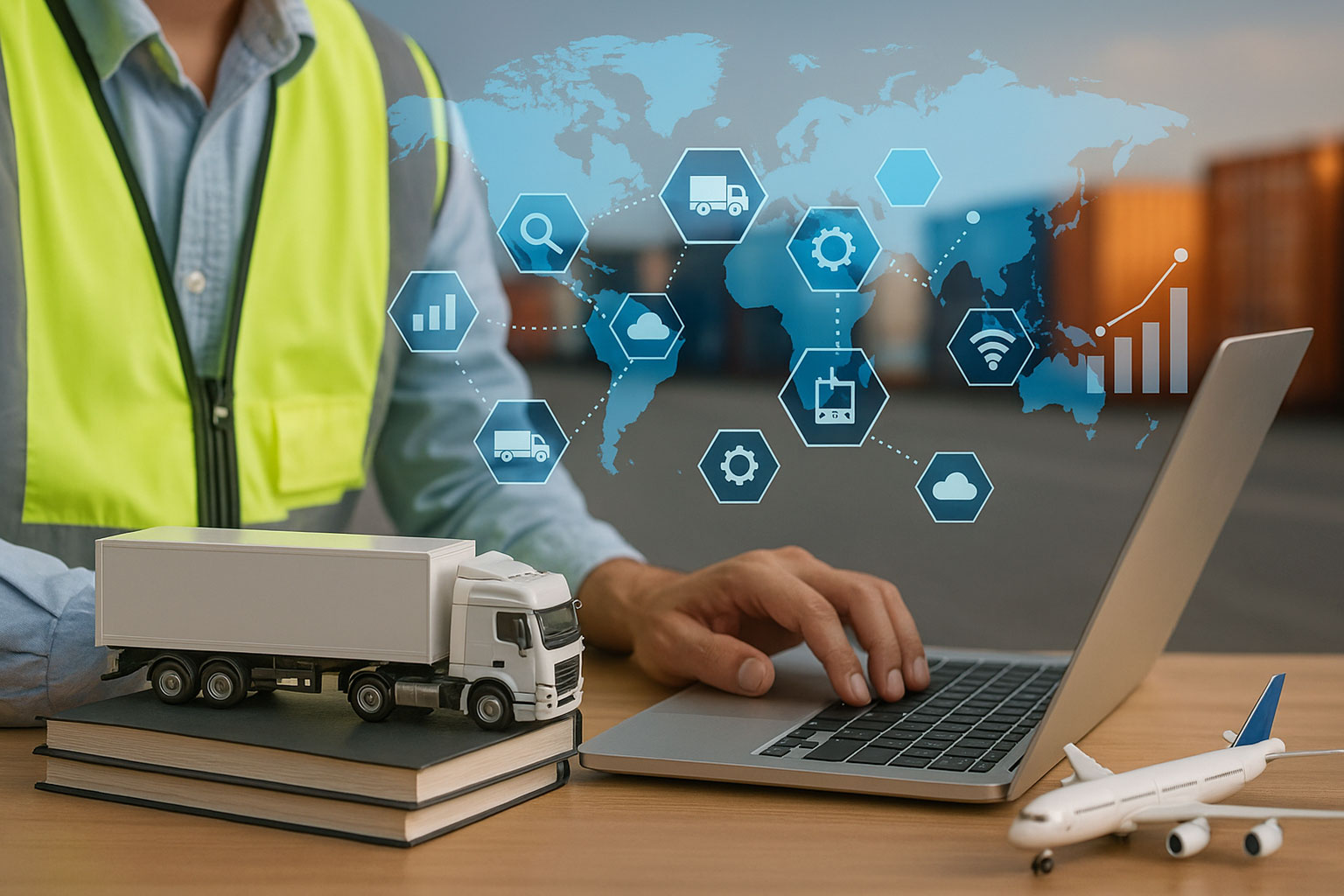Best Logistics & Transportation Software Development Companies in 2025: Features, Cost, and Tech Trends

09 Oct 2025
In 2025, logistics and transport companies are not only about shifting cargo anymore, but about shifting information, automating processes, and anticipating what is going to happen before it occurs.
The logistics industry is going through a digital revolution with AI-enabled fleet tracking, smart warehouse management, and more.
Be it a trucking start-up, a supply chain business, or a freight management firm, the right software development company in the logistics business will define how efficiently you will run, how quickly you will grow, and how competitive you will remain.
Here, we are going to discuss what makes the best logistics and transportation software development company in 2025, what your software must be like, current trends in technology, and how to select the appropriate development partner to serve your business.
Why Logistics Software Development Matters in 2025
Automation, integration of the IoT, and AI-enabled analytics are all putting the global logistics software market above an estimated 25 billion by 2025. Businesses are also spending a lot of money on custom transportation management software (TMS) and warehouse automation platforms to streamline their operations.
The major motivations of digitalizing logistics companies:
- Real-time visibility: Customers now expect live delivery tracking and predictive ETAs.
- Cost control: Automation will decrease the amount of paperwork, fuel, and idle fleet time.
- Sustainability: Data-driven logistics reduce waste and carbon emissions.
- Compliance: Automated systems provide safety and compliance with tax in all jurisdictions.
A modern logistics software development company in 2025 focuses on integrating AI, IoT, predictive analytics, and cloud platforms to deliver seamless, smart logistics ecosystems.
Top Features of High-Performing Logistics & Transportation Software
In your collaboration with a logistics application development firm, ensure that your system has the following key features:
1. Real-Time Fleet Tracking Solutions: Track vehicles, monitor routes, and optimize delivery timelines with GPS and IoT sensors. Google Maps and RFID tags integrations and predictive route planning increase efficiency.
2. Warehouse Automation Software: AI and robotics-driven smart warehouses help to track inventory and minimize human error, as well as turnaround factors.
3. Predictive Analytics in Logistics: Predict demand, resource distribution, and prevent delivery log jams using AI models.
4. Freight Management System Development: Global logistics is simplified with automated freight quotes, shipment documentation, and custom clearance tools.
5. Supply Chain Visibility Software: Suppliers to final delivery, businesses can have a complete picture of all the stages, enhancing accountability and transparency.
6. Logistics ERP Software Development: End-to-end integration of ERP relates finance, operations, and HR in a seamless enterprise management.
7. Trucking Software Solutions: Provide dispatch scheduling, route optimization, and driver management tools to the trucking companies.
8. Cloud-Based & SaaS Logistics Platforms: Cloud hosting provides scalability, uptime, and accessibility remotely, which are important for distributed teams that handle global supply chains.
Emerging Logistics Tech Trends in 2025
In 2025, the developers of the best logistics software are creating AI-based, future-oriented systems able to focus on efficiency and the accuracy of data. The following are some of the trends that are influencing the upcoming logistics technology:
- AI & Machine Learning: Smart automation of demand forecast, fraud, and driver behavior.
- IoT in Transportation Software: Sensors, smart sensors, and GPS connectivity guarantee real-time operational visibility.
- Blockchain Integration: To have safe and transparent records of shipments and anti-fraud records.
- Autonomous Fleet Technology: Self-driving automobiles and drone delivery are now more than ever before.
- Sustainable Logistics: Carbon-tracking dashboards and eco-routing software to reduce emissions.
- Cloud Integration: The software of logistics software based on SaaS allows real-time collaboration and reduction of infrastructure expenses.
How to Hire the Right Logistics Software Development Company
The process of identifying the finest logistics software development firm in 2025 will involve obtaining a partner that is knowledgeable in technology as well as the logistics business, both in and out.
Here’s what to look for:
1. Industry Expertise: Select developers who have worked with TMS, WMS, and fleet management systems.
2. Compliance Knowledge: They should be aware of regional laws, namely, the DOT, IFTA, and customs compliance.
3. Proven Portfolio: Request case studies or demos of other previous logistics projects.
4. Technology Stack Knowledge: Make sure that they scale on React, Node.js, .NET, Flutter, Python, and AWS.
5. Post-Launch Support: Systems need constant maintenance and updates to remain secure and optimized.
6. Open Process: Find agile workflows that have periodic progress reports, which are milestone-based.
Pro Tip: You should not only hire developers, though, but also problem solvers who will turn your logistics workflow into an intelligent and data-driven ecosystem.
Estimated Development Insights (Without Mentioning Cost)
It will be based on the size, capability, and functionality of your solution, a mere fleet tracking app, or a full-fledged transportation management system with AI analytics.
The logistics application that allows a shipment-tracking portal but optimizes the routes, has internet-of-things tracking, and an analytics dashboard is more complicated to create than a simple track the shipment portal.
In order to get a realistic estimation, you should refer to the specialists who can analyze your operations and propose a unique digital roadmap that will be appropriate according to your business model and budget.
Why Choose NanoByte Technologies for Logistics Software Development
At NanoByte Technologies, we are a company that focuses on custom software solutions in the field of logistics and transportation, which assist companies to automate, optimize, and scale with a lot of confidence.
The following is the reason why logistics executives believe in us:
- End-to-end development: Ideation through to maintenance.
- Cloud-first approach: We develop start-up and enterprise scalable SaaS logistics platforms.
- IoT and AI integration: Predictive analytics and real-time tracking automation.
- Security-first mindset: GDPR, international logistics compliance, and encryption.
- Programmed to your industry: You work in the trucking, warehousing, or e-commerce logistics.
We not only develop logistics software, but also efficiency, visibility, and expansion for your business.
Want to digitalize your logistics operations?
Contact NanoByte Technologies today for a free consultation and get a custom roadmap for your next-generation logistics software.
Conclusion: Smart Logistics Is the Future
The year 2025 is the time when logistics will enter a new phase with automation, data intelligence, and connectivity on a global scale. The companies that invest in the appropriate logistics software development company now will spearhead the transformation of the supply chain tomorrow.
It does not matter whether you are a startup creating your first logistics app or an enterprise moving to an AI-powered platform; having an experienced development partner such as NanoByte Technologies makes sure that your business is in the fast lane of innovation.
Modernize your logistics operations.
Smart, faster, and more sustainable logistics together.
Contact NanoByte Technologies to get started.
FAQs: Logistics Software Development 2025
Q1. How to hire a logistics software development company in 2025?
Find firms that have logistics expertise, specific expertise, case studies, and experience on AI, IoT, and ERP integrations. NanoByte Technologies provides a complete system and development services related to the logistics business.
Q2. What are the top features of modern logistics software?
It is necessary to have fleet tracking, route optimization, predictive analytics, warehouse automation, and cloud-based dashboards, which are necessary to be efficient and scalable.
Q3. What factors affect the cost to develop logistics software in 2025?
Complexity, tech stack, and feature requirements determine your investment. When establishing clear timelines and deliverables, it is always advisable to start with a feature roadmap.
Q4. What industries benefit from logistics automation software?
The AI-driven logistics solutions benefit trucking, freight forwarding, warehouse management, retail, and manufacturing.
Q5. How does AI improve logistics operations?
AI is used to predict demand, avoid delivery delays, and optimize routing, which saves time and cost, as well as increases customer satisfaction.

.jpeg)



